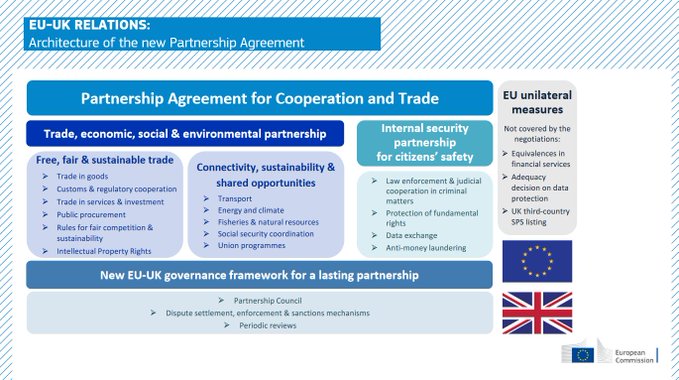On 1 January 2021, the United Kingdom left the EU Single Market and Customs Union, and all EU policies.
On 24 December 2020, EU and UK negotiators reached an “agreement in principle” on the text of a new “Trade and Cooperation Agreement” to govern their relations now that the UK has left the EU. Both parties must now advance with the signature and ratification
of this Agreement in line with their respective rules and procedures, with a view to its provisional application as from 1 January 2021.
More about trade agreements HERE.
The Agreement consists of:
1. an unprecedented free trade agreement,
2. ambitious cooperation on economic, social,
environmental and fisheries issues,
3. a close partnership for citizens’ security,
4. an overarching governance framework.
Free, fair and sustainable trade
The EU-UK Agreement goes beyond recent EU free trade agreements with other third countries such as Canada or Japan, by providing for zero tariffs and zero quotas on all goods. This is especially important for sensitive goods such as agricultural and fishery products. For instance, without the agreement, exports of certain meat or dairy products would have faced tariffs above 40% under WTO rates, or 25% for canned fish
– either way. Exports of cars would also have been hit by a tariff of 10%.
To benefit from these exceptional trade preferences, businesses must prove that their products fulfil all necessary ‘rules of origin’ requirements. This ensures that the trade preferences granted under the Agreement benefit EU and UK operators rather than 3rd countries, preventing circumvention. To facilitate compliance and cut red tape, the Agreement allows traders to self-certify the origin of goods and provides
for ‘full cumulation’ (meaning traders can account not only for the originating materials used, but also if processing took place in the UK or EU).
Read the full document HERE.
Source/Image Credit: EU TRADE





